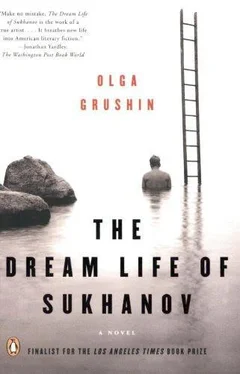The church had a single darkened dome with no cross on it.
“How very old it is,” Sukhanov said, looking at the carvings of strange beasts covering the once white walls. “Fourteenth century, perhaps?”
Dalevich gently took his elbow and guided him along the path into an unkempt yard encircled by more low, peeling houses.
“Actually, no, it’s quite new,” he said readily. “Designed in a pseudo-Russian style by one Aleksei Shchusev, at the turn of the century. This used to be a convent, founded by the Grand Duchess Elizaveta Fyodorovna in 1908, if I’m not mistaken. Naturally, soon after the Revolution the convent was closed, the royal benefactress thrown alive down a mineshaft—and then, in a nice twist, Shchusev went on to build the Lenin Mausoleum and the ever-so-charming Hotel Moskva. The history of architecture—like any other history, I suppose—is simply full of these little ironies, don’t you find? Ah, and that over there is Oleg’s house, he rents a… Tolya?”
Sukhanov had stopped a few paces away with a wondering look on his face.
“So peaceful here,” he said with an apologetic half-smile. “I just wanted… Listen for a moment.”
Overcast stillness reigned about them, yet it was not altogether quiet. Dusty sparrows chirruped in the dense undergrowth; a young woman, her head covered with a somber kerchief, walked hurriedly across the yard, raising small, timid sounds in her wake—a pebble rolling, a door creaking on its hinges, a splash when her foot slipped into a pool of rainwater; and if one listened very closely, one could almost hear the purple flowers rustling against the church walls. In the early, aromatic days of summer, there would be many butterflies, yellow, white, and orange, spiraling like sunspots over these weeds, which, Sukhanov somehow knew, were called ivanchai —Ivan’s chai, Ivan’s tea—an odd, lyrical name that came back to him all at once from a remote childhood lesson, bringing with it a host of other soft-hued recollections of his fourteenth, his fifteenth years: the flowers he had pressed patiently between book pages for botany class; the birds calling to one another high in the trees during his solitary runs through the woods, with his head upturned to drink in the sun-dappled colors of the sky; the comforting, sweet, slightly decaying smells of the earth meeting him as he had fallen exhausted and newly rich into the grass…. Yes, this yard smelled a bit like that, of dying flowers and rain and past summers, and it was strange to think that only a stone’s throw away, on the other side of this wall, a monstrous city unfolded its hectic streets, rumbling with buses, crowded with people, littered with ticket stubs and candy wrappers and other chaff of tired, ephemeral enjoyments—for here, all around him, were the sounds and scents and colors not of the capital but of some small provincial town miles and ages away, a town that was dreary, neglected, yet somehow dear… A town, in fact, very much like Inza in the Ulyanovsk region, three crammed, malodorous, frightening train rides from Moscow, where my mother and I spent two years in wartime evacuation.
We lived in a drafty one-story house on the outskirts, taken in by a taciturn aunt of some chance family acquaintance. I shared a corner with the woman’s two sons, and every morning the three of us would stumble together through darkness and snow to a school on the other side of town. And it was there, in the early winter of 1942, that I met Oleg Romanov, a onetime pupil of Chagall and now an unprepossessing teacher of drawing—and in the course of one lesson, while my bored schoolmates passed notes and hand-rolled cigarettes across the freezing classroom, I unexpectedly had a glimpse of the truth.
I had long since decided that art was a dangerous, shameful secret of my half-forgotten early childhood, woven out of decadent dreams and seductive songs by demigods from magical far-off countries in centuries past, preserved for a brief while by devious betrayers of the state, then washed away forever with the melting Arbat snows. Now I saw that I had been mistaken. Art was not a private embarrassment or a wicked foreign enchantment. Even more amazing, art was not dead. It continued to live, today, now, in this sorry little town that had some two hundred houses and not a single paved street—and it was brought into existence on an average day by a modest man called Oleg Romanov—a man with a funny lisp and nearsighted eyes—a man who was not very different from other men I knew and yet who somehow, out of nothing, out of the cold, grave, broken world about him, could summon to life those misty, shining landscapes of unfolding vistas, so uniquely his own….
For several nights I barely slept, weighing my discovery and all its implications in my reeling soul. Then, at a lesson two or three weeks later, after I had spent a torturous hour struggling to draw an increasingly tricky cup, Romanov called me aside.
“You show potential, Sukhanov,” he said almost reluctantly. “An interesting effort—trying to depict both the outside of the cup and its contents with one image. I can give you private art lessons if you like.”
That was another revelation: Art, that glowing, elusive miracle, that sublime universe populated by divinities, could be taught—and an awkward sketch of a teacup could somehow hold the key to a priceless apprenticeship. It would be a lot of work, of course, Romanov said sternly. I would have to start noticing the world around me, learn its smells, its colors, its sounds, the shapes and textures of its creatures, from a deceptively plain sparrow and a common yellow butterfly to man, the glory of creation; I would wrest the secrets of dyes from the earth at my feet, memorize the tints of sunset and the shadows of rain, distinguish between the many shades of white, read a rainbow like a poem—and one day, after much effort, many sleepless nights, and mounds of broken pencils and matted brushes, I might finally arrive at… at…
“I’m afraid we are running late,” said the soft voice of Fyodor Dalevich.
And as Sukhanov emerged from his impossibly vivid daydream and met his cousin’s politely questioning eyes, he felt something new, something dark, stir inside him. And that something was dread, numbing, overpowering dread—for as he stood in the middle of the yard belonging to his evacuation years and listened to the echo of memories fading in the depths of his being, he understood precisely toward what future abyss his recollections were pushing him, mercilessly, inexorably…
“Forgotten something?” Dalevich inquired with a helpful smile.
“On the contrary,” Sukhanov stuttered, “I’ve just remembered I… There is something I must do. Please apologize to your friend—tell him some other time, perhaps….”
He turned to walk away.
“Of course, I understand,” Dalevich called out after him. “Although I was hoping we could finish our discussion. I meant to tell you about this article I’ve written—”
Sukhanov glanced back at the quiet, overgrown yard, at the darkened windows, at the flaking paint on the low buildings, in one of which someone named Oleg was at this very moment awaiting his arrival….
“Some other time, perhaps,” he repeated flatly.
Then briskly, without another look, he strode toward his present.
The clock on Sukhanov’s desk showed ten past six when Nina cracked open his door and, without entering, told him that she was leaving to meet a friend for a play and would be home late.
“Don’t wait for me with supper,” she said, adjusting the clasp of her bracelet, which kept snapping open.
He noticed that she wore unfamiliar earrings, delicate silver spirals, which, dangling gently along her neck, made her face look thinner and somehow younger. Her lipstick seemed new as well, a girlish pink instead of her usual muted peach.
Читать дальше








![Theresa Cheung - The Dream Dictionary from A to Z [Revised edition] - The Ultimate A–Z to Interpret the Secrets of Your Dreams](/books/692092/theresa-cheung-the-dream-dictionary-from-a-to-z-r-thumb.webp)



